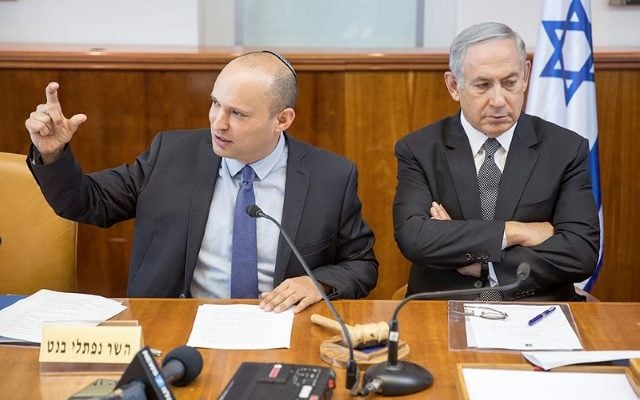Bennett and Netanyahu reached an agreement on the Regulation Bill, however, it does not prevent the demolition of Amona.
Prime Minister Benjamin Netanyahu and Education Minister and Bayit Yehudi Chairman Naftali Bennett reached an agreement late Sunday evening on the comprehensive “Regulations Package,” including the Regulation Bill, which legalizes Jewish communities in Judea and Samaria that were established with state involvement and possibly built on private land or land not owned by the state.
It does not include Clause 7, which would retroactively apply the law to cases on which the High Court has already ruled and, therefore, would have prevented the destruction of the town of Amona. Netanyahu requested from the High Court a one-month delay in order to find accommodation for the residents.
Amona residents have threatened to “physically protest” an eviction.
The Regulation Law stipulates that communities built on private land or non-state-owned land will not be demolished. Rather, the land will be expropriated from the original owner, who will be compensated. It addresses hundreds of instances in which Israelis built homes with government consent or encouragement, later to discover that the land may be privately owned or otherwise in dispute.
The law was advanced against the backdrop of a ruling by the High Court of Justice that the state must dismantle nine houses in the community of Amona, situated north of Jerusalem, by the end of 2016.
Netanyahu met Saturday night for several hours with Bennett in an effort to find a compromise on the bill. They did not reach an agreement, and discussions continued on Sunday.
The Knesset has been working feverishly to find a solution ahead of High Court of Justice’s deadline of December 25 for the demolition of the homes in Amona.
Defense Minister Avigdor Liberman had urged postponing the vote on the bill until after US President-elect Donald Trump assumes office next month. He reiterated his stance that the future of Israel’s presence in Judea and Samaria depends on understandings with the U.S.
Netanyahu, however, told the annual Brookings Institution’s Saban Forum for Middle East Policy on Sunday that the U.S. does not decide Israel’s settlement policy.
Speaking at the beginning of the weekly cabinet meeting on Sunday, Netanyahu said that the coalition was “working overtime to find a responsible solution to the issue of Amona and for similar cases in the future. We are working to reach a rational solution… We must act responsibly and prudently here for a common goal: To defend the settlement enterprise, and to defend the court [and its ruling]. We are working in both spheres.”
By: Aryeh Savir and Atara Beck, World Israel News




